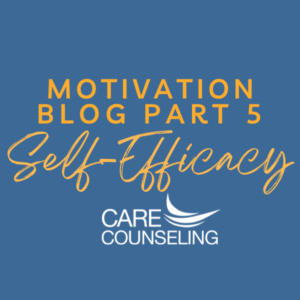
Welcome back! Now that you’re on part 5 of this series (be sure to check out previous posts if you haven’t seen them yet), I hope you have found a few strategies that help you work with or work around motivation. To keep building on these, this week’s motivational “by-passer” is: Building self-efficacy may be particularly helpful for you if you struggle with feeling defeated, experiencing a lack of resources or access, or don’t feel like you know how to move forward.
For our purposes, you can also think of “self-efficacy” as doing what works and focusing on what is in your control.
Research shows that self-efficacy is built in four key ways. Below, I’ll share specific strategies for each to help you increase your self-efficacy for whatever task is currently looming over you:
Persuasion
- Write yourself a letter. When you are in a good state of mind, write yourself a brief letter to remind yourself why you know you can do this. Research has demonstrated that even when people don’t initially agree with something, if they need to support it in a persuasive essay or debate, they are more open to those ideas afterward. Therefore, persuade yourself!
- Get a pep talk. As a friend or relative (whoever you find most convincing) to be your personal motivational speaker for a few minutes. Absorb what they’re saying and get goin’!
- Talk to your inner child. Imagine your 6-year-old self (are you picturing a cute-yet-awkward kiddo whose front teeth recently fell out?), or imagine a younger sibling or cousin standing in front of you. If they were doubting whether they could do something, what would you tell them? Those words of encouragement are just as true for you!
Vicarious Experience
- Watch someone else do it. Be around others who are doing what you want to do. Go see some local cover bands if you’re learning to sing, sit in a café or library if you want study motivation, or go to the gym to see others working out. When we see others achieving what we want to do, it can seem much more do-able.
- Emulate someone. Think of a friend, role model, or even fictional character who has done what you are trying to achieve, imagine how they would do it, and mimic them.
Conducive Physical States
- Remind yourself of success. Grab a post-it and write down a time that you did this activity successfully before, or when you did something that was similarly challenging or used a similar skillset. Place that reminder somewhere that you’ll see it often. Maybe you’ve never attempted stand-up comedy before, but you were in a play in high school and can draw on that experience.
- Regulate. Sometimes, we legitimately need a snack, some sleep, or a pick-me-up before we jump into another to-do. Check-in with yourself if you’re hesitating about getting started and address any needs you have. Just be sure to not use this as a procrastination tool (after all, maybe you do need a quick snack before stepping onto the yoga mat, but you probably don’t need to attempt a 5-course meal from scratch).
Successful Performance
- For this last self-efficacy enhancer, we’ll need to use the Nike motto: Just Do It. It’s okay to promise yourself you’ll just try it once and decide about future attempts afterward – there’s no need to sign up for a year-long commitment just yet. But ultimately, to truly believe that you can do something, you’ll need to do it.
If you’d like to receive support in implementing these strategies, contact us to be connected with a therapist.
Written By : Jaime Ascencio
We’re Here to help
Our wellness experts will be happy to take care of you. You can CLICK HERE to schedule an appointment now or call (612)223-8898.
Meet Clinicians
We’re united by our commitment to providing effective, relevant, and innovative mental health support at all stages of your journey. Click Here to find out more about who we are, where we come from, and how we live out CARE’s mission every day.
The professionals at CARE are actively collecting and creating resources to help with what you need. We’re Here for You.



